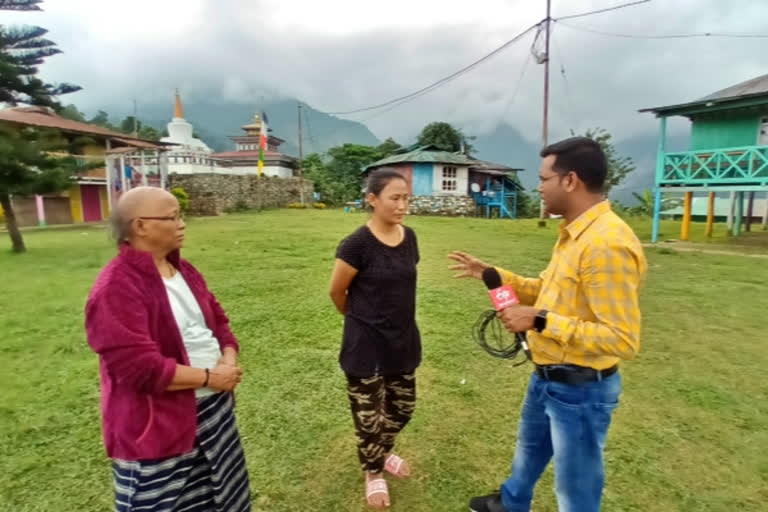Lepchkha (West Bengal): What do you do with the body of a person after death? Many burn them, a majority bury them, few keep them on high towers for the scavengers to feed but here is a story of a small nearly extinct tribe of merely 2000 people whose practice of cremation and funeral might surprise everyone.
The Dukpa community – a branch following Tibetan Buddhism- living in a far-flung village at the foothills of the Himalayas on the Indo-Bhutan border waits for instructions from the Buddhist Lamas living in Bhutan before the funeral. According to the villagers they might have to wait for days or even weeks before they are allowed to burn the bodies.
“We have to keep the bodies inside the room and wait for the instruction. Once the instruction comes then we will take the body out of the house according to their instructions. If there is no door on that side of the house then we will have to break the wall and take the body out for cremation,” Indajan Dukpa, a resident of Lepchakha village said.
There are even instances when the villagers had to burn the house because of the omen effect of the dead. “There are many examples when we had to break the wall but recently there were no such instances of burning the house. Nearly 10 years before when Kitin Dukpka died, the Lamas instructed us to burn the house and we had to do so,” Joy Dupka, another resident said.
According to the villagers, the dead body cannot be kept alone and one will have to attend to the dead so long the person is not burned. “All the holes of the person’s body like the nostrils, ear-holes, mouth and other places will have to be filled up with ghee (clarified butter). Once we get the instruction we will have to take the body to the crematorium,” Joy said.
The Drugpa, also called as Dukpa is a rare kind of tribe, inhabiting majorly the hilly terrain of North Bengal as well as Bhutan and Sikkim. In North Bengal, the area inhabited by the community is a hilly terrain covered with a thin forest of Buxaduar, Chunabhati, Tasigaon, Lepchokha, and Adma.
The Dukpas are genetically Mongoloid descendants. With the coming of the 16th Gyalwa Karmapa, the spiritual head of the Kurma Kagvu order of Buddhism, a large number of Bhutanese migrated to Sikkim in the early 1960s. The Bhutanese addressed themselves as ‘Drugpa’ or residents of the ‘Dragon Land’ (Drug meaning Dragon and Pa meaning resident).
According to the experts, the process of preserving the body for days is a practice followed by Balinese Hindu dead are generally buried inside a container for a period of time, which may exceed one month or more so that the cremation ceremony (Ngaben) can occur on an auspicious day in the Balinese-Javanese Calendar system ("Saka"). Additionally, if the departed was a court servant, member of the court, or minor noble, the cremation can be postponed up to several years to coincide with the cremation of their Prince.
However, the experts believe that the Dukpa community – an offshoot of Tibetan Buddhists doesn’t follow the Tibetan tradition even. In the Tibetan tradition, a waiting period of four days after death is usually observed prior to the funeral or cremation as many Buddhists believe that the soul is still “in transition” for a period of time after death. When asked about it, a resident of the village said, “This is what has been continuing for years and we are just following it”.



